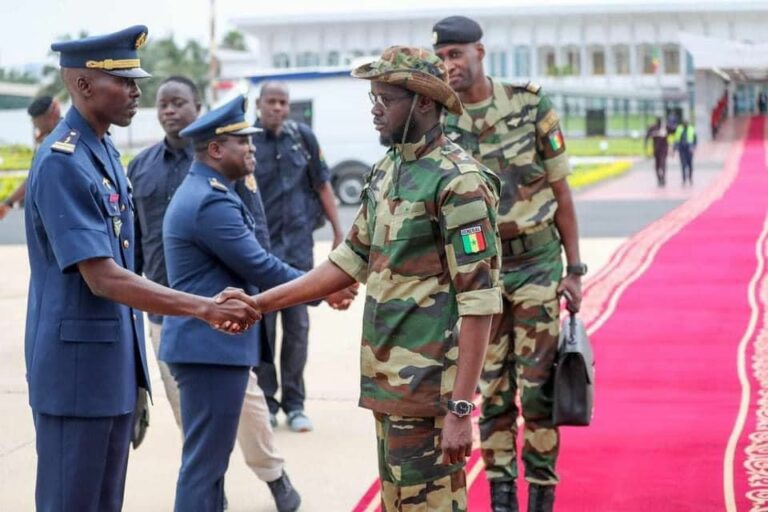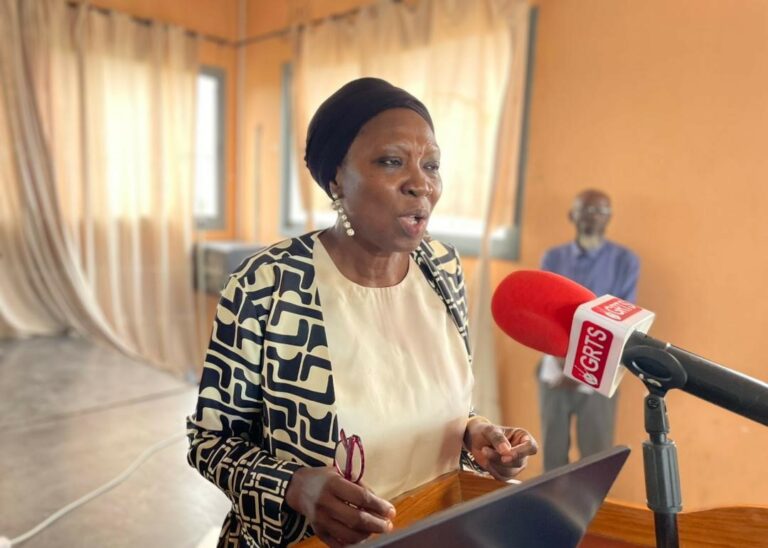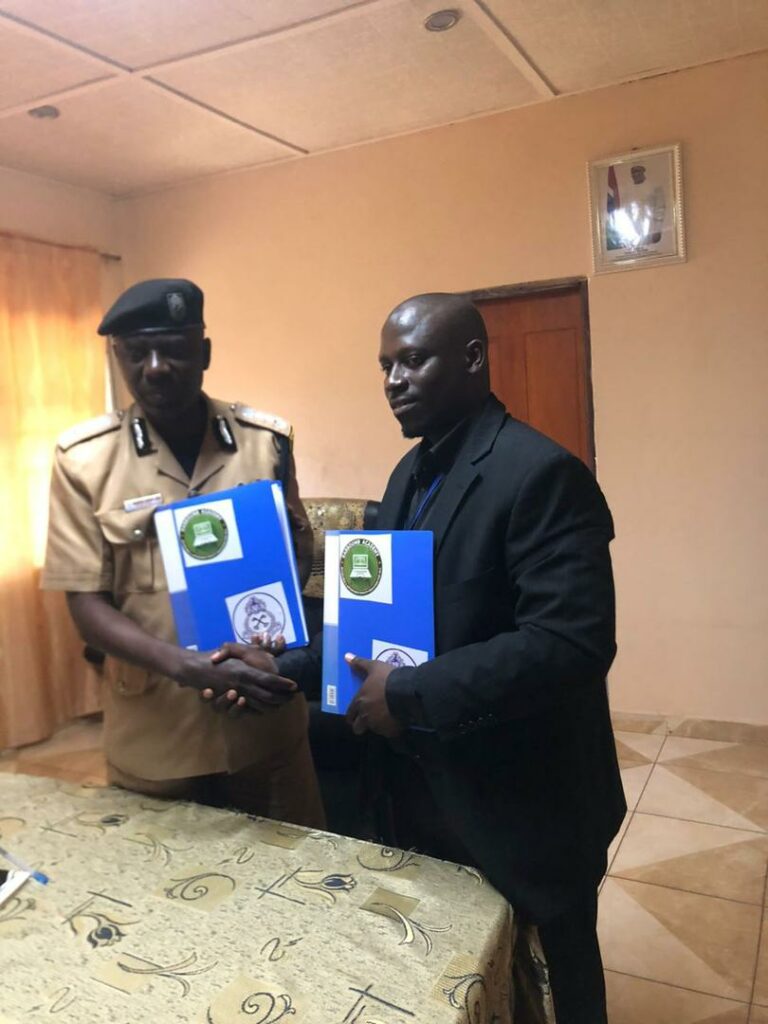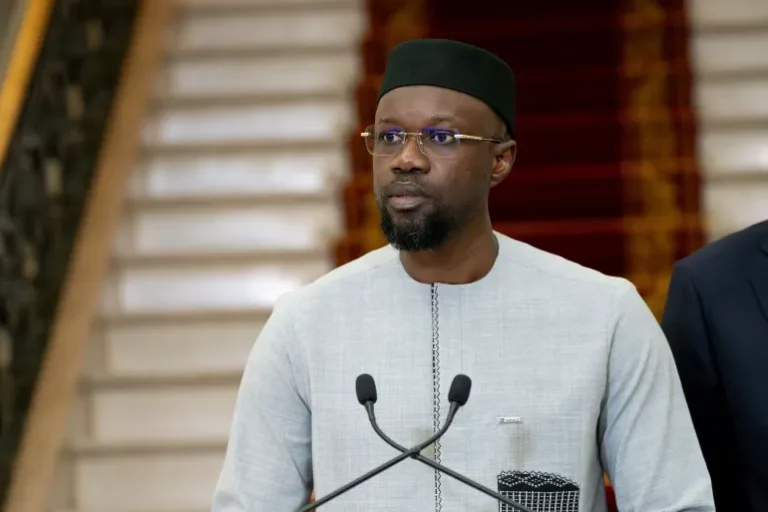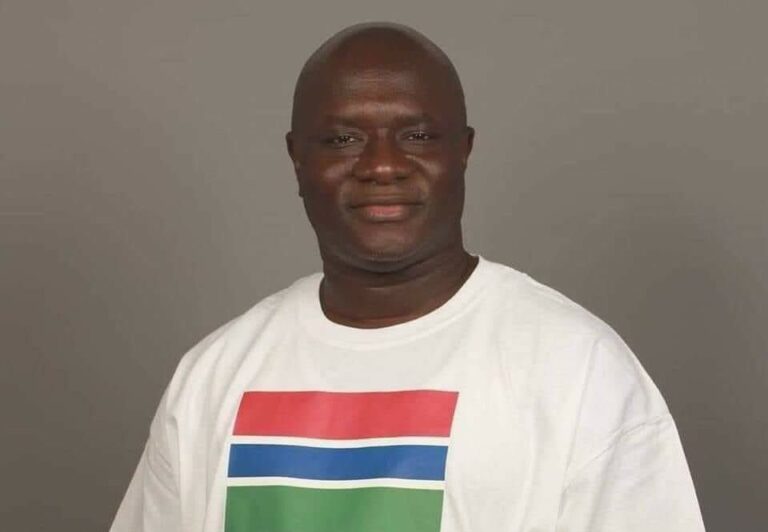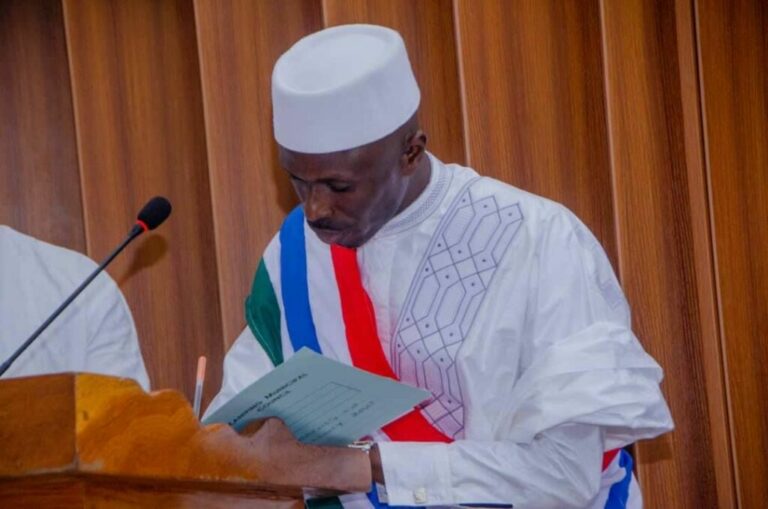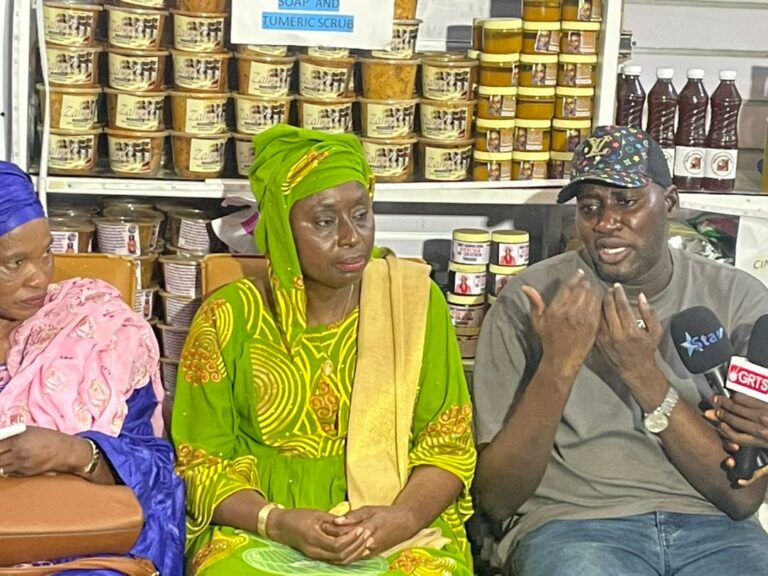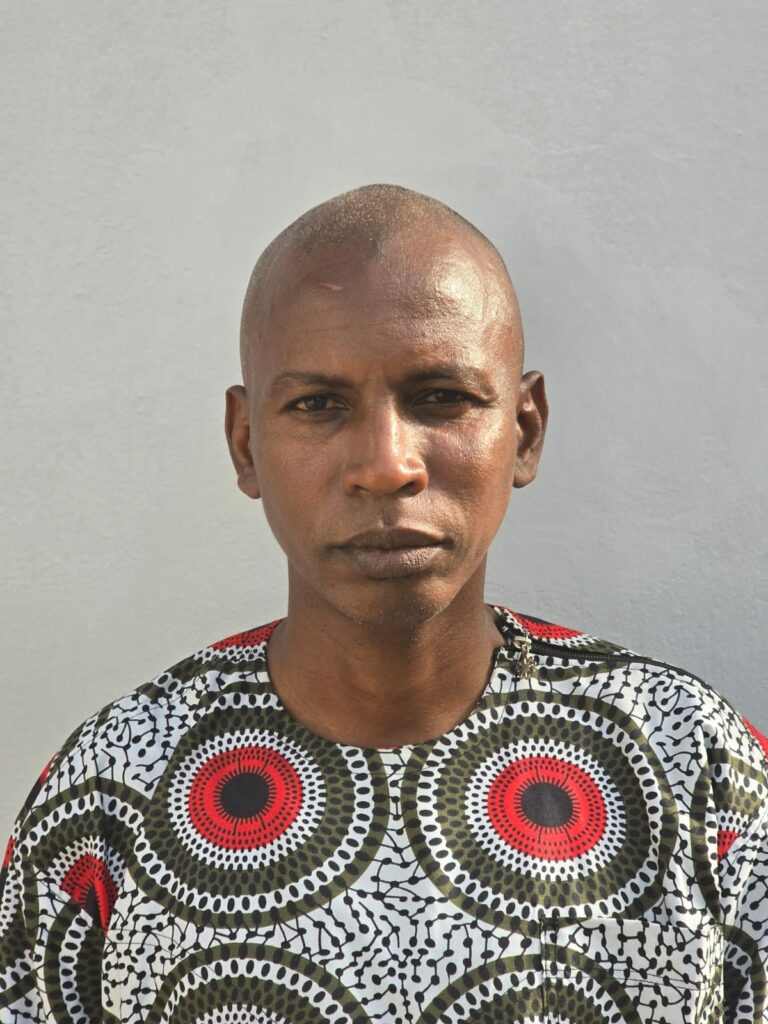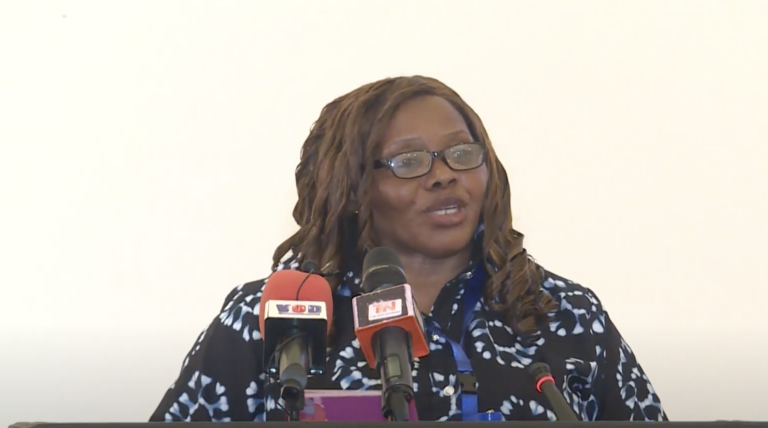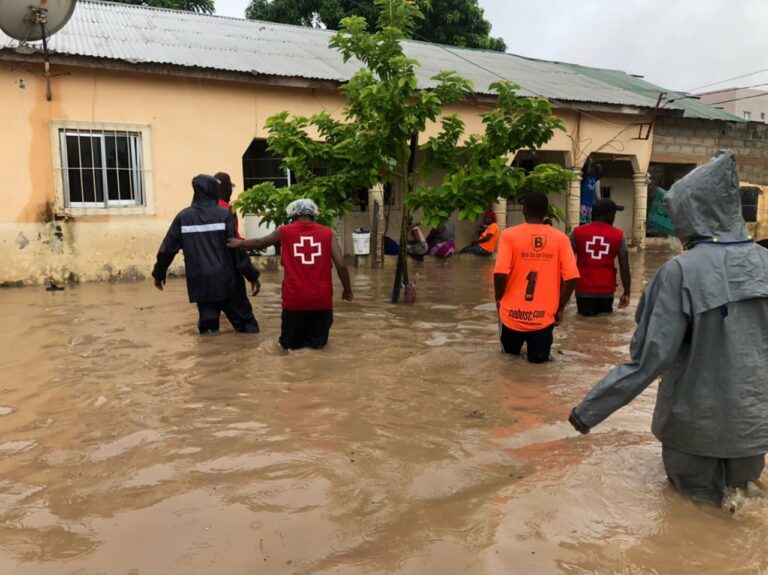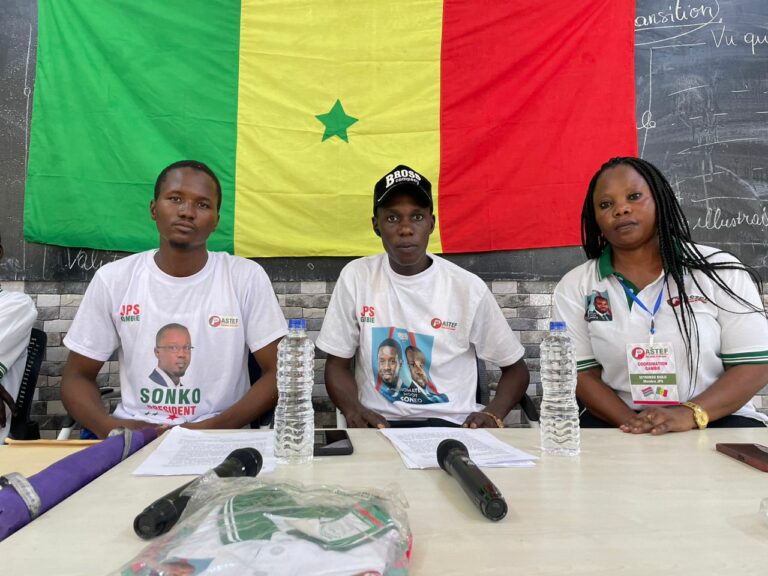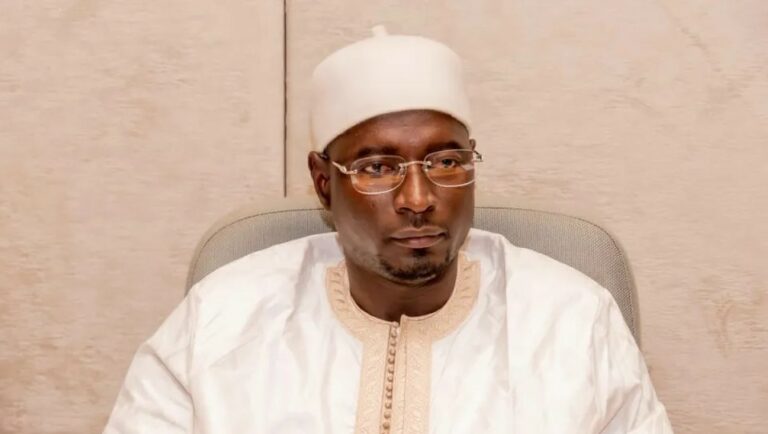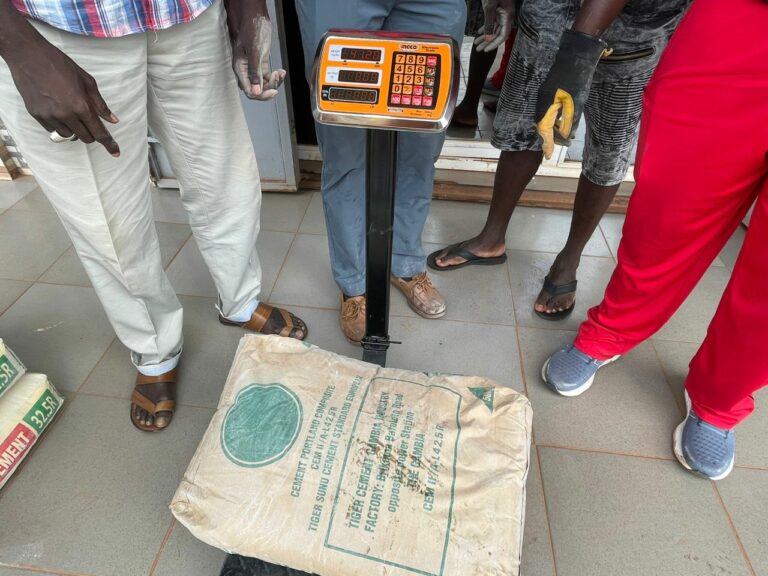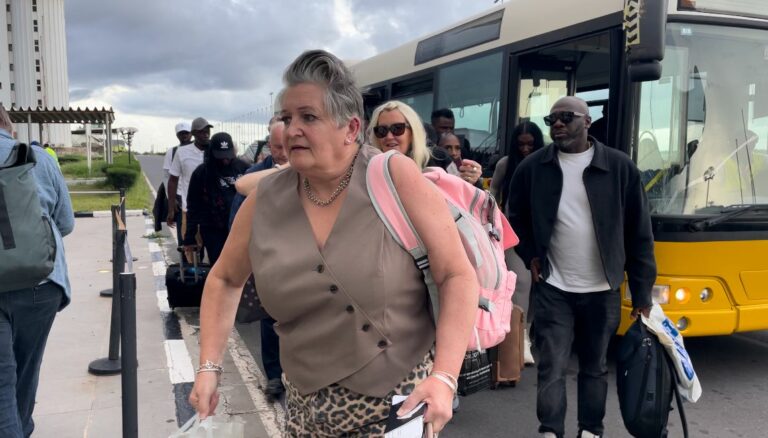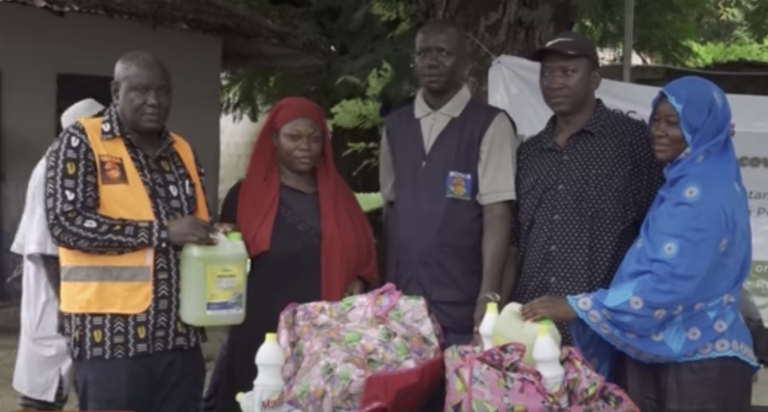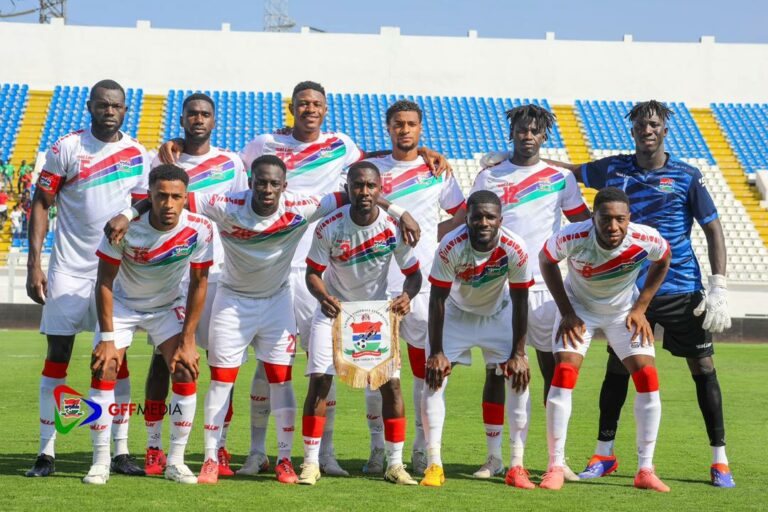Senegal’s President Faye Visits Kédougou Amid Flooding Crisis Affecting Thousands
Liver Cancer Disease Most Common Among Gambian Men, Killing 3 Weekly
By: Dawda Baldeh
At the start of an awareness campaign about liver cancer and its complications at the Edward Francis Small Teaching Hospital (EFSTH) in Banjul yesterday, health experts disclosed that liver cancer is the most common deadly cancer among Gambian men, killing at least three each week.
Speaking to journalists at yesterday’s campaign ceremony, Professor Ramou Njie, a liver specialist at the University of The Gambia, highlighted the importance of raising awareness about liver cancer, describing it as a deadly disease affecting all genders. She stressed the importance of mitigating liver cancer through proper medical procedures.
Prof. Nie also disclosed that over 950,000 liver cancer cases were diagnosed worldwide in 2020, of which 850,000 resulted in death. According to her, in The Gambia, liver cancer is a leading cause of death among men and the third leading cause among women. “Three Gambians are dying of liver cancer each week, and it is the most common among men,” she said.
Prof. Njie emphasized the importance of early vaccination to prevent the transmission of liver cancer, stating that early detection can significantly reduce the risk of death. “Most people die if they are hepatitis B positive, but not all. If we catch them early, the chances of survival will increase,” she added.
Prof. Njie stressed the importance of keeping records to help implement strong measures to track progress and challenges. “I looked at the cancer registry from about eight years ago, but we don’t have the means to enter chronic liver diseases. When you consider the deaths from cirrhosis and its complications, along with cancer, we have actually underestimated the number of deaths,” she explained.
Dr. Cherno Jallow, the Deputy Chief Medical Director at the Edward Francis Small Teaching Hospital, spoke the significance of the day and challenged health workers to lead the campaign. “This campaign is timely, and as health workers, we have a great role to play in saving lives,” he said.
Meanwhile, Dr. Sheikh Omar Bittaye also warned people to take liver cancer seriously to mitigate fatal outcomes. “Liver cancer doesn’t spare anyone, whether you are rich or poor,” he said, adding that no one is safe if everyone is not safe. “We have seen both rich and poor individuals, senior government officials, private citizens, and others dying from this disease. We have to take these measures seriously,” he added.
Kabboumb Academy Signs MoU with GPS to transform lives of inmates through education
By Dawda Baldeh
In a move designed to help transform inmates into productive citizens, Kabboumb Academy and Gambia Prison Services (GPS) Wednesday signed a Memorandum of Understanding (MOU) focused on changing the lives of inmates through education and training.
The ceremony was characterized by a sense of hope and teamwork, with Abdoulie Bojang, the Academic Director and Founder of Kabboumb Academy, leading his committed team alongside Ansumana Manneh, the Director General of Gambia Prison Services.
This forward-thinking partnership is set to initiate a comprehensive educational and training program for prisons that will benefit both inmates and prison staff over the next five years.
The MOU details a commitment to offering a diverse array of educational programs, including web design and development, dental technology, legal and psychology courses, aluminium design and fabrication, graphic design, public policy, social work, community development, business development, innovation, and entrepreneurship, among others.
With programs available from certificate to postgraduate levels, this initiative aims to empower over 5,000 inmates, transforming them into self-sufficient and productive members of society.
The event was attended by distinguished officials from both Kabboumb Academy and Gambia Prison Services, who shared their excitement for this transformative project.
The prison authorities have already designated a specific structure and space to support these educational programs, ensuring that inmates have the necessary resources to succeed.
“This partnership is not solely focused on education; it’s about providing individuals with a second chance,” said Abdoulie Bojang the Academic Director of Kabboumb Academy.
“We believe that every individual has the potential to make a positive contribution to society, and through this initiative, we seek to equip them with the skills and knowledge required to flourish,” he added.
Director of Prison Ansumana Manneh reiterated these thoughts, highlighting the significance of rehabilitation and reintegration into society.
“By investing in education and training for our inmates, we are investing in a brighter future for our communities,” he remarked.
As the signing ceremony came to a close, the atmosphere was filled with hope and enthusiasm for what lies ahead.
This partnership between Kabboumb Academy and Gambia Prison Services represents a crucial advancement toward nurturing a culture of learning and development within the prison system, paving the way for a more inclusive and supportive society.
Officials said by signing the MoU they are sparking a movement that will inspire change, empower lives, and establish a legacy of hope for future generations.
Ousmane Sonko: Upcoming Elections Key to Justice for Macky Sall and Ministers
Madi Jobarteh Calls on Parliament to Expedite a New Constitution
By: Alieu Jallow
Human rights activist Madi Jobarteh has called upon Parliament to expedite the creation of a brand-new constitution that could serve as a beacon of hope for The Gambia. Jobarteh’s impassioned plea highlights a pivotal moment in the nation’s ongoing journey toward democracy and human rights. He emphasized that the Constitution already enjoins Parliament to uphold their conscience and the public interest when making decisions, noting that this principle should guide them in their efforts to salvage the country.
“National Assembly Members must recognize that this country needs a new constitution that will create a truly democratic dispensation with strong checks and balances to make the state truly transparent and accountable while giving the people their full rights,” he stressed.
Jobarteh articulated a vision of a Gambia where every citizen’s rights are preserved and where governance reflects the will of the people. “There is a need to create a new Gambia founded on the principles of justice, equality, and inclusion. We also need a state where public officials are effective, efficient, and responsive in delivering public goods and services,” he outlined.
For years, The Gambia has navigated turbulent waters, grappling with the legacy of autocracy and widespread human rights violations. Under the previous regime, the Constitution was often overlooked or manipulated to suppress dissent. In light of this history, in 2017, the Constitution Review Commission was set up to draft a new constitution that reflects the wishes and aspirations of Gambians. However, it was voted down by the 5th Legislature as it failed to meet the two-thirds threshold. Subsequently, the 2024 draft was gazetted in Parliament, but it has generated widespread public outcry, with some describing it as “Barrow’s draft.”
The activist also stressed the need for provisions that safeguard basic freedoms, gender equality, and the rights of marginalized communities. He argued that without such measures, The Gambia risks repeating the mistakes of its past.
“The 1997 Constitution is weak on these principles and foundations, which is why there is rampant abuse of power, corruption, and inefficiency in government institutions, thereby denying citizens opportunities and services to live a quality life,” Jobarteh stated.
He stressed that National Assembly Members have a unique responsibility and opportunity to properly structure the state to become a true instrument for democracy and development.
MC Cham Criticizes Barrow’s Corruption Allegations Against Opposition-Led Councils
By: Dawda Baldeh
Momodou Cham, alias MC Cham Junior, Councillor for Business and Tailoring at Kanifing Municipal Council, has criticized President Adama Barrow’s recent statements accusing opposition-led councils of corrupt practices. Cham believes that Barrow has no grounds to criticize anyone over corruption.
He described Barrow’s comments as “the pot calling the kettle black,” citing alleged rampant corruption within the central government.
Cham claimed that the ongoing Local Government Commission of Inquiry has not found any opposition-led council involved in corruption. “The levels of corruption exposed by the National Audit Office within your government are huge,” he said. “To clarify, Mr. President, the ongoing commission has not found fault with any elected mayor or council chairman across the regions, except for the former NPP Chairman of Brikama Area Council, Sheriffo Sonko.”
According to Cham, President Barrow’s claims regarding the commission seem ill-informed. “So far, only civil servants appointed by the Local Government, per the Local Government Act and PMO, have been implicated, according to the testimonies we have all heard,” Cham continued, noting that these individuals are employees hired by the central government and the Ministry of Local Government and Lands. “Local government councils have no authority to hire or discipline these officials,” he added.
Cham went further: “Once the commission concludes its investigation and releases its findings, we will see how you handle their recommendations. Under your administration, you have previously ignored the recommendations of the Janneh Commission, the TRRC, and the National Audit Reports, wasting taxpayers’ money in the process.”
“We had hoped that your government would avoid further waste by not duplicating the work of the National Audit Office and the Local Government Service Commission, which had already uncovered corrupt practices among senior public servants in both central and local governments,” Cham emphasized.
According to him, UDP Opposition Leader Ousainou Darboe does not need to respond, as his party’s elected officials have not been found guilty of any corruption.
Cham reiterated that the individuals implicated in corrupt activities are civil servants hired by the central government and imposed on local councils, or NPP-elected officials. “We hope that once the commission concludes, you will implement their recommendations impartially and without bias,” he said.
Macky Sall’s Return to Senegal Deemed “Dangerous”
“I’m Impressed With the Incredible Work” – Minister Kinteh Commends Njie Charakh and Women Entrepreneurs in Serrekunda
By: Dawda Baldeh
Fatou Sanyang Kinteh, Minister of Children, Women, and Social Welfare, paid a visit to Njie Charakh World Market Business Enterprises in Serrekunda on Wednesday, October 16th. During her visit, she praised the remarkable achievements of Njie and the women entrepreneurs, expressing her admiration for what she called their “incredible work.”
Minister Kinteh and Njie Charakh, the CEO of Njie Charakh World Market, engaged in an extensive discussion about creating more opportunities for women and girls. The Minister expressed her gratitude towards Njie, acknowledging the significant contributions he is making in support of government initiatives.
“I am truly impressed with the incredible work Njie and the women are doing. I can hardly believe we have such remarkable individuals like Njie,” she stated.
The Minister also described Gambian women as diligent and encouraged them to collaborate as a team. “These women are achieving great things here, and I want to motivate them to work together,” she stated.
Following her tour of the Serrekunda facility, Minister Kinteh had a direct dialogue with the women entrepreneurs, who shared their achievements and challenges. The Minister recognized the efforts of the women and Njie and promised them government support. “We will certainly collaborate with Njie and support the women economically through him,” she assured.
In a spirited mood, Njie Charakh described the Minister’s visit as an inspiration for him and the female entrepreneurs. “Having the Minister here, despite her busy schedule, is significant. I believe in hard work, and we will continue our current efforts,” he said.
Njie, a mentor to many, reaffirmed his steadfast commitment to aiding women. “I aim to create as many jobs as possible,” he remarked.
Other speakers included Amie Nyang, Fatou Bah, Oley Ndow, and Aisha Ali, all entrepreneurs producing various products and striving to succeed in the thriving entrepreneurial landscape. They collectively urged the government to support Njie in his entrepreneurial ventures, as he is investing substantial resources to assist young entrepreneurs.
“Njie requires all the support from the government because he is helping numerous women and girls,” stated Ms. Ndow.
They portrayed Njie as a patriotic citizen willing to make sacrifices to ensure the success of women and youth. “Njie does not want to see women suffer,” remarked Fatou, another entrepreneur.
Aisha Ali, a young entrepreneur and student at the University of The Gambia majoring in Biology, echoed similar sentiments regarding Njie. “Supporting Njie is supporting The Gambia,” she said.
Agro Youth Project Empowers Gambian Farmers through Training and Sustainable Solutions
By Michaella Faith Wright
The Agro Youth Project Gambia, managed by Yero Bah under the Collective Action for Sustainable Development Organization, is driving agricultural development across the West Coast Region through training programs and sustainable solutions to address challenges faced by local farmers.
The Agro Youth Project Gambia is being implemented in the West Coast Region to promote agro-entrepreneurship and sustainable farming practices. “We are conducting several activities, starting with data collection to inform our agro-entrepreneurship training program for selected trainers,” Yero Bah, the project manager, explained.
The project emphasizes the Training of Trainers model, where participants undergo five days of intensive sessions in agricultural entrepreneurship. The project also integrates UNLEASH Hack Gambia, a global initiative aimed at identifying local agricultural challenges and developing solutions. As part of the project, team members visit farmers and agriculturalists to understand their struggles and explore ways to resolve them.
One of the primary challenges identified during these visits is water scarcity, which continues to hinder crop production. “After assessing these challenges, we returned to conduct further workshops to align with our partners in Germany,” said Bah. The project not only focuses on technical agricultural practices but also introduces business strategies to help farmers see agriculture as a viable commercial enterprise.
Another milestone of the Agro Youth Project is the successful training of 15 agricultural trainers, conducted in collaboration with German partners through both online and in-person sessions. Additionally, 16 women entrepreneurs from the West Coast Region participated in intensive workshops designed to empower them and promote gender inclusion in the agricultural sector.
“Through these initiatives, we hope to shift perceptions about agriculture in The Gambia and provide solutions for a better future where the country can produce its own food,” Bah emphasized. He also highlighted the importance of patience and knowledge in agriculture, stressing that sustainable farming requires time and dedication.
The project aims to build capacity across agricultural institutions in The Gambia, encouraging collaboration to overcome challenges such as resource management, commercial agriculture skills, and sustainable farming practices.
“We want to create a better Gambia — one that can meet its food needs independently and empower farmers through knowledge and entrepreneurship,” said Bah, manager of Agro Youth Project Gambia
SHO Urges Robust Safety Policies After Tragic Electrocution of 7 Sub-NAWEC Contractors
By Alieu Jallow
Following a tragic incident in North Bank where seven NAWEC subcontractors were killed due to electrocution, Abdou Ceesay, a health and safety officer, emphasized the urgent need for improved safety measures and accountability, noting that the incident could have been averted or minimized if proper safety measures had been put in place.
He cited negligence and regulatory failures in an interview with The Fatu Network.
Last Wednesday, October 9, the North Bank community was shocked by a tragic electrocution event that claimed the lives of seven individuals. Reports indicated that the victims were changing an old electric pole when a sudden surge of electricity struck, leading to a cascade of devastation.
“My observation of this tragic incident is total negligence of safety measures as they were working basically without personal protective equipment as they only had a helmet which was not tied to their heads and some of them were using slippers to work,” he said.
During the ongoing police investigations, Ceesay claimed that the company did not comply with safety regulations nor properly train their employees for working in hazardous conditions.
He also pointed out that the reflectors worn by them were not suitable, as they provided only static light and were therefore not recommended.
“It is just a negligent conduct. The safety officers in the company did not live up to expectations as they flouted the safety measures,” Ceesay said.
The tragic outcome of this incident brings to light wider issues regarding regulatory compliance and enforcement in The Gambia. In response, Ceesay stated that his foundation would push for the implementation of a safety policy act across all Gambian institutions to prevent such unfortunate fatalities.
“Effective regulatory frameworks are essential to prevent such tragedies. We can only sympathise and sensitise, and we will try to work with the government to provide a sympathy package for victims”.
NANHRI Launches Status of Transgender
NANHRI Launches Status of Transgender
NDMA, govt to build 31 homes for 2022 flash flood victims as 2,650 households nationwide affected
By Zackline Colley
The National Disaster Management Agency, in collaboration with the Gambian government and supported by funding from the French Development Agency, is set to build 31 new houses for individuals whose properties were utterly devastated by the floods of 2022.
The necessary funds, according to the NDM, have already been secured.
“The funds are already in our possession. The NDMA has sent staff for verification because targeting the most hit victims is the most difficult task in humanitarian work because everyone is affected but we are working according to the level of damage among the affected households,” Sanna Dahaba, the executive director of the NDMA, said.
The 2022 heavy rains left many households across the country in urgent need of help with 2,650 households affected nationwide. In the Kanifing Municipality (KM) alone, a total of 1,892 households were affected.
Dahaba has confirmed that many households have suffered damage and that the focus will be on assisting those who were severely affected and urgently require new housing.
Meanwhile, during this year’s rainy season, the National Disaster Management Agency (NDMA) reported a tragic incident in Farafenni after a heavy flash flood. A building collapsed following heavy rainfall, resulting in the death of a two-year-old child.
Dahaba noted that historically, Farafenni was not susceptible to flash floods; however, recent years have seen a growing concern. He ascribed the rising frequency of floods in Farafenni to climatic changes.
“Due to climate change, predicting disaster events has become increasingly challenging. Although Farafenni has never been known as a hotspot or flood-prone area, the unexpected event last week that resulted in one fatality and other damages underscores the significant issue of climate change,” Dahaba said.
MC Cham rebukes Pres. Barrow over corruption allegations against opposition-led councils
By Dawda Baldeh
Momodou Cham, also known as MC Cham Junior, who serves as the Councillor for Business and Tailoring at Kanifing Municipal Council, has criticised President Adama Barrow’s recent statements accusing opposition-led councils of engaging in corrupt practices.
Cham believes that Barrow has no grounds to criticize anyone over corruption. He described Barrow’s comments as “the pot calling the kettle black”, citing rampant alleged corruption within the central government.
Cham claimed that the ongoing Local Government Commission of Inquiry has not found any opposition-led council found wanting of corruption.
“The levels of corruption exposed by the National Audit Office within your government are huge.
“To clarify, Mr President, the ongoing commission has not found fault with any elected mayor or council chairman across the regions, except for the former NPP Chairman of Brikama Area Council, Sheriffo Sonko,” he said.
According to Cham, President Barrow’s claims regarding the commission seem ill-informed.
“So far, only civil servants appointed by the Local Government, per the local government act, and PMO have been implicated, according to the testimonies we have all heard,” Cham added, adding that these individuals are employees hired by central government and the Ministry of Local Government and Lands.
“Local government councils have no authority to hire or discipline these officials,” he added.
Cham continued: “Once the commission concludes its investigation and releases its findings, we will see how you handle their recommendations.
“Under your administration, you have previously ignored the recommendations of the Janneh Commission, the TRRC, and the National Audit Reports, wasting taxpayers’ money in the process.”
“We had hoped that your government would avoid further waste by not duplicating the work of the National Audit Office and the Local Government Service Commission, which had already uncovered corrupt practices among senior public servants in both central and local government,” Cham emphasized.
For him, Darboe does not need to respond, as his party’s elected officials have not been found wanting of any corruption.
Cham stated that the individuals implicated and adversely mentioned in corrupt activities are civil servants hired by the central government and imposed on local councils, or NPP elected officials.
“We hope that once the commission concludes, you will implement their recommendations impartially and without bias,” he said.
PASTEF Gambia Youth Wing Calls for Resolution of Internal Conflicts
By Dawda Baldeh
The youth wing of PASTEF, the ruling party in Senegal, recently held a meeting in The Gambia to address internal issues affecting the party.
Led by Cheikh Fanta Mady Keita, also known as Kara, the Senegalese community in The Gambia discussed ongoing internal disputes and the need for resolution.
“There are numerous internal conflicts in PASTEF Gambia, and we want these to be addressed. The executive members are not fulfilling their responsibilities,” he stated.
Cheikh and his fellow youth members accused the party leadership in the Gambia of undermining party values and disrespecting the youth.
“We want our leaders in Senegal to be aware of what’s happening here in the Gambia. If we allow this to persist, it will ruin the party,” he added.
Cheikh emphasised that PASTEF leader Ousman Sonko taught them the importance of honesty and that no one should behave otherwise.
According to Cheikh, the conflict arose when the party executive in the Gambia selected a candidate for the upcoming Senegalese National Assembly election whom they claim is not well-known.
They preferred Frederic Jarjue, the party coordinator in the Gambia, to be the chosen candidate.
“Frederic is someone who does everything possible for the Senegalese in the Gambia. He understands the issues we face here and has always supported us,” he said.
Cheikh stated that Alhassane Niang, the candidate selected by the executive, is not suitable.
“This is the biggest mistake the party has made. How can you select someone who is not recognized within the Senegalese community here and who does not engage in any Senegalese affairs?” Cheikh questioned.
They characterized Frederic as a selfless leader who has made sacrifices for the Senegalese community.
“We are concerned that this candidate, Alhassane, will not take our issues seriously because he does not care about us,” he added.
Cheikh further accused the executives of showing disrespect towards Frederic Jarjue.
“They referred to him as handicapped and made decisions without informing him,” he said.
Meanwhile, Seynabou Badji, a member of PASTEF Gambia JPS, believes that the government is unaware of the conflicts they are experiencing in the Gambia.
“If we remain passive, things will worsen. We are the ones here, and we understand the challenges the Senegalese are facing,” she stated.
Ms. Badji also expressed her discontent with Alhassane’s candidacy.
“He’s not a suitable candidate. We want someone who will represent the general interest, not just a few individuals,” she said.
According to her, even the Senegalese opposition in the Gambia was prepared to support Frederic Jarjue if he had been the selected candidate for PASTEF.
PASTEF Gambia JPS accused Yassin Dien of using her influence to create divisions among party members.
“She is aiming for the position of Ambassador, and that’s why she’s doing everything possible to ensure another candidate is elected.
“Yassin Dieng believed she owns PASTEF and can act as she pleases,” she added.
Ms. Badji also claimed that Yassin disrespects everyone, and her actions do not align with party policies, describing her as a discriminatory individual.
Gambia’s Deputy Speaker Says Gambia is Committed to Achieving 100% Universal Access to Electricity by 2025
By: Alieu Jallow
The Gambia’s Deputy Speaker, Seedy Njie, stated that the country is committed to achieving universal access to electricity by 2025. He made these remarks at the 149th Inter-Parliamentary Union Assembly in Geneva.
“The government of The Gambia, under the leadership of His Excellency President Adama Barrow, is committed to achieving universal access to electricity, aiming for 100% coverage by mid-2025. The 23 megawatt (MW) Jambur Solar Power Plant, completed in 2023, is a landmark achievement in expanding our renewable energy capacity and reducing greenhouse gas emissions,” he said.
The Deputy Speaker highlighted that The Gambia offers valuable lessons in community-based natural resource management and climate resilience. He noted that in 2017, The Gambia gained global recognition for being one of the few nations to meet its national climate goals under the Paris Agreement. He attributed this success to the nation’s proactive approach to environmental challenges, focusing on local climate adaptation solutions.
“Our climate leadership continues with our second Nationally Determined Contribution (NDC2), which outlines our commitment to reducing greenhouse gas emissions by 49.7% by 2030, focusing on key sectors such as energy, waste management, and agriculture. By leveraging science, technology, and innovation (STI), The Gambia has adopted renewable energy solutions, including the 20MW solar PV plant under the Gambia Renewable Energy Program (GREP),” he explained.
Additionally, Deputy Speaker Njie emphasized that the government has also digitalized social protection systems, aligning with the global agenda to harness STI in achieving SDG 1, which aims to eradicate poverty.
“The Gambia Social Protection Single Registry, launched in 2021 with support from the World Bank, serves as a unified database identifying vulnerable households nationwide. This system ensures that key social protection programs, such as cash transfers and entrepreneurial loans, reach those most in need,” he stated.
With ongoing conflicts in various regions, Mr. Njie stressed that Gambia’s leader, who doubles as the Chairman of the Organisation of Islamic Cooperation (OIC), has raised concerns about areas like the Sahel, where terrorist groups operate, and conflict-ridden regions such as the Democratic Republic of Congo and Sudan. He emphasized that technology plays a decisive role in restoring peace and urged the global community to do more to harness STI for peace in regions plagued by violence, resource competition, and political instability.
Jah Oil, Gacem Accused of Selling Under-weight Cement Bags
By Dawda Baldeh
Members of the Association of Cement Importers and Traders Alliance of the Gambia have accused Jah Oil and Gacem cement companies of selling under-weigh bags of cement contrary to their 50kg label.
They described this as a criminal act and called on the Gambia Competition and Consumer Protection Commission (GCCPC) to intervene to ensure consumers receive the value for their purchases.
The association members made these allegations following a routine inspection of various cement stores and retail outlets on Saturday, October 12th, 2024.
During the inspection, members bought several bags of cement from different local bargaining companies at various locations and conducted a weighting test.
During the weighing test conducted in the presence of the media, the cement association members alleged that certain local bagging companies were filling the 50kg bags with only 41-48kg cement and misrepresenting them as 50kg bags. They view this as criminal conduct.
Accordingly, the association discovered that Salam Company is the “only one currently selling true 50kg bags of cement” in The Gambia.
They reported that, upon inspection, bags of cement purchased from retailers Gacem and Jah Oil did not meet the 50kg standard.
They expressed concern over this issue, characterising it as exploitation of Gambian consumers by providing bags of cement that are not up to 50kg.
Speaking to journalists on Saturday, Momodou Jobe, a member of the Cement Importers and Traders Alliance said: “We have found that some local bagging companies (Jah Oil and Gacem) are not providing the correct quantity of cement.
“The labelling on their packaging indicates 50kg, but this is not the reality as far as our investigation is concerned.
“We conducted a random weighing from different stores. If you buy cement from any company, go weigh it and see what you have.
“So far, we have discovered that Jah Oil is filling their bags from 41kg, 43kg, 45kg, or up to 47kg, while Gacem is filling their bags from 45kg to 49 and they are selling them to the public without any suspicion.
“This is unacceptable and violates competition rules,” Jobe said.
Jobe further advised customers to check the cement they purchased at any store.
“We visited numerous retail shops and outlets, and what we discovered is astonishing; so far, only Salam Trading is selling genuine 50kg bags of cement.
Jobe revealed that the highest weight of the cement they purchased from Jah Oil from different locations, including their store in Coastal Road was 47kg.
Jobe also alleged that local bagging companies are charging consumers between 5 to 15 per cent more than the actual amount.
“They make substantial profits in the millions from cheating on customers,” he alleged.
According to Jobe, the local bagging companies are taking advantage of consumers and called on the GCCPC to take action by verifying the weight of cement bags sold to unsuspected Gambians who are paying for more than they get.
“The Gambian consumers are the ones suffering because no one is receiving the quantity they paid for; per kilogram, they are paying more for cement.
“Imagine buying cement for D380 expecting 50kg but receiving only 40kg; this means they are overcharging you for 10kg, and this situation arises when there is a lack of competition in the market,” he said.
Other speakers included Baba Drammeh, a member of the alliance who was also part of the inspection team.
Like many others, Mr. Drammeh expressed his dissatisfaction with local bagging companies.
“These people are robbing the customers in a daylight. People are paying for what they are not getting. These companies are cheating the customers almost D57 per bag,” he said.
Mr. Drammeh questioned why Jah Oil is still maintaining the price of cement at the same price even though the Euro has risen significantly.
“This tells you that they are cheating the customers. The government needs to take action and regulate the market to ensure that each bag of cement sold to consumers weighs 50kg as labelled.
“The government should impose penalties on those who fear competition and are reinforcing the monopoly of the cement industry in the country,” he added.
Efforts to get comments from Jah Oil and Gacem remain unsuccessful at the time of this publication. The Fatu Network will keep trying to get their side of the story.
However, the Gambia Competition and Consumer Protection Commission (GCCPC) has issued a statement warning businesses from the alleged sale of underweight bags of cement and warned to take serious measures.
“We encourage all affected customers to file a formal complaint at the commission about any discrepancies they observed in the weight of cement bags or its label,” the commission said.
This situation has arisen amid increasing concerns among the cement importers and traders alliance regarding the Government’s actions on road transportation of cement, which have exceeded previously established fees.
Gambia Tourism Board Celebrates The Madian Arrival of 175 UK Tourists, Ushering in The 2024-2025 Tourism Season
Gambia Tourism Board Celebrates The Madian Arrival of 175 UK Tourists,
Ushering in The 2024-2025 Tourism Season
2024-2025 Tourist Season: Visitors Describe Gambia as Favorite Destination
By: Dawda Baldeh
The arrival of the first flight marks a significant milestone for The Gambia’s tourism sector, which has been steadily recovering and growing in recent years.
Tourists who arrived in Banjul on Friday from London described The Gambia as their favorite destination, saying it’s peaceful.
The Gambia Experience has been a key player in promoting the country as a prime holiday destination, and the enthusiastic reception of tourists at Banjul International Airport reflects this effort.
Becky, who is visiting The Gambia for the third time, shares her excitement about returning to the country.
“I love the warmth of the people and the beautiful beaches. This year, I brought my daughter along so she can experience the culture and beauty of The Gambia,” she said, her eyes sparkling with anticipation.
Dias, a first-time visitor, expressed his eagerness to explore the local attractions.
“I’ve heard so much about the stunning landscapes and the vibrant culture. I can’t wait to try the local cuisine and visit the national parks,” he shared, clearly looking forward to his adventure.
Christ, a seasoned traveler to The Gambia, spoke fondly of the country. “Every time I come here, I find something new to appreciate.
It’s such a calm and peaceful place, perfect for relaxation and exploration,” he noted, reflecting on his many visits.
As the tourists prepare to embark on their journeys across The Gambia, the atmosphere remains vibrant and welcoming.
The sounds of traditional drumming and the smiles of local residents create a warm environment that sets the tone for a memorable holiday.
Foday Bah from the Gambia Tourism Board emphasized the importance of this season for the country’s economy.
“We are thrilled to see the first flight arrive, and it showcases the dedication of everyone involved in promoting The Gambia as a tourist destination.
We are committed to ensuring that every visitor has a safe and enjoyable experience,” he stated.
With the expectation of over 233,000 arrivals and a robust schedule of flights, the tourism sector is poised for a successful season.
The Gambia’s unique blend of natural beauty, cultural richness, and warm hospitality continues to attract visitors from around the world, making it a cherished destination for many.
Support Continues for 2022 Flash Flood Victims in KM
Support Continues for 2022 Flash Flood Victims in KM
The Gambia Secure Crucial Late Equalizer in 1-1 Draw Against Madagascar
By Zackline Colley
The Gambia secured a crucial late equaliser in a hard-fought 1-1 draw against Madagascar during their AFCON 2025 qualifier.
The tension-filled match saw Yankuba Minteh score the dramatic late goal, ensuring that The Gambia earned a valuable point. The team’s performance leaves them in contention as they prepare for their upcoming match on Monday, where securing three points will be crucial to bolster their position in the group.
Following the match, head coach Jonathan McKinstry expressed relief at the late equaliser, emphasising the team’s relentless efforts and tactical adjustments throughout the game. McKinstry acknowledged the missed opportunities and the team’s shift to a 3-2-5 formation in the closing stages, demonstrating their commitment to securing a positive result.
Despite facing relentless pressure from The Gambia, Madagascar displayed defensive resilience and managed a few breakaway chances. McKinstry praised his team’s defensive efforts, highlighting their ability to cover Madagascar’s breakaway attempts effectively.
Reflecting on the match, McKinstry identified The Gambia’s ongoing struggle with defending set pieces as a key issue that led to Madagascar’s opening goal. He emphasized the need for improved defensive organization and personal responsibility in set-piece situations.
McKinstry also addressed the disallowed goal controversy, standing firm in support of the referees’ decision to rule out Madagascar’s late goal for handball. He commended the referees for their strong decision-making and emphasized the clear nature of the handball, supported by the officials on his side.
Acknowledging the team’s performance, McKinstry recognized the potential for improvement while highlighting the positive aspects of their play. He emphasized the need to enhance offensive execution and set-piece defense as the team prepares for their next crucial match on Monday.
Looking ahead, McKinstry emphasized the team’s objective of securing three points in the upcoming match to strengthen their position in the group, underlining the importance of sharpening their set-piece defense and refining their offensive capabilities as they strive to qualify for the AFCON 2025 tournament.

